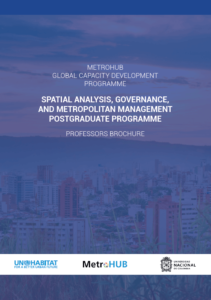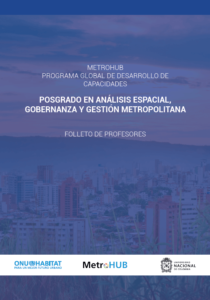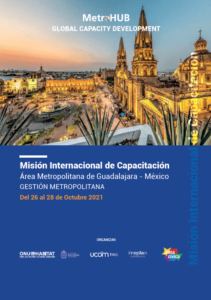MetroHUB Global Capacity Development Programme
UN-Habitat’s Policy, Legislation and Governance Section established the MetroHUB Capacity Development Programme. This programme supports development of capacities for metropolitan management, through training with an emphasis on policy, governance, legislation, and planning at metropolitan scales. It enhances the knowledge of urban leaders, local actors, and public servants to manage metropolitan areas and develop instruments and tools that allow better governance, financing and planning of metropolises. This programme focuses on all target groups in UN-Habitat’s capacity building strategy, namely local, sub-national and national governments, as well as private, academic, community and civil society sectors, aiming contributing the consolidation of a new metropolitan discipline and metropolitan practice in territorial management.

The lines of action of the MetroHUB Capacity Development Programme consists of:
Line 1. Training
The contents may vary according to the local context as well as the focus of the academic institutions, government or NGOs serving as UN-Habitat partner for the respective training. Each of the courses contains recent data and trends, case studies, assessment methodologies and frameworks, and one MetroLab, which is a workshop to apply the knowledge and methodologies learnt to the analysis and solutions-design in one specific metropolitan case. The urban and metropolitan policy and governance course covers topics such as: institutional solutions, decision-making, collective action, citizen participation, multilevel governance, digital governance, subnational and sectoral policies, among others. The urban and metropolitan legislation course covers: regulatory frameworks enabling territorial management, regulatory compliance with global development agendas, good and effective legislation, the right to the city, and international trends on metropolitan legislation. The urban and metropolitan planning course includes: principles and approaches to territorial planning, planning instruments, trends in metropolitan planning, urban-rural linkages, migration, public health, and urban economy.
During the World Metropolitan Day 2020 UN-Habitat in partnership with the National University of Colombia, presented the post-graduate programme on “Spatial Analysis, Metropolitan Management and Governance. That way, the MetroHUB Capacity Development Programme started to be implemented in the first quarter of 2021 in Colombia, with the participation of 30 people enrolled in metropolitan subjects, from different disciplines such as social, political, and economic sciences; engineering of different specialties; urban planners and architects, all of them under doctorate, master, and specialization studies.
RESOURCES
Courses of the Postgraduate Programme:
The MetroHUB programme has received widespread recognition in the Latin America region as it was featured on in several partner websites.
Line 5. Universities Network

Heritopolis (UNI-Metrohub)






